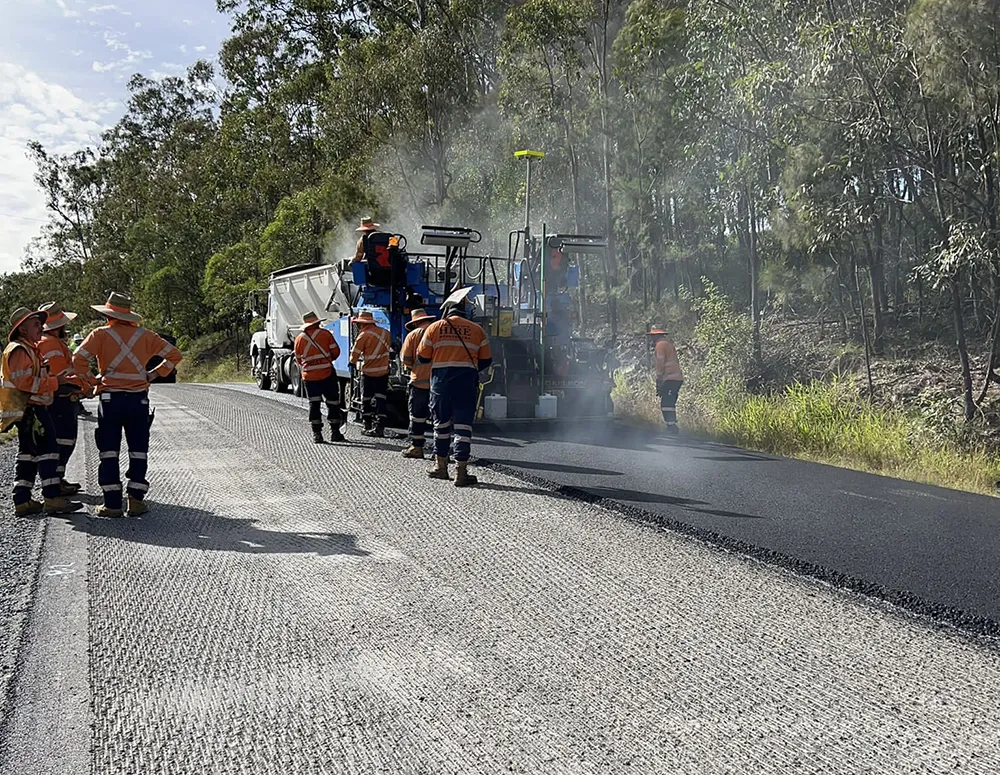
In England, National Highways has extended trials of biogenic binders to include warm mix asphalt and up to 30 per cent reclaimed asphalt.
Heidelberg Materials and the AtkinsRéalis Jacobs Joint Venture have partnered with National Highways on the trials which have taken place on the A2 and A34 highways. The companies said that the trial sections will be closely monitored to review performance and whole-life carbon reduction.
The trials of bio-binders to include warm mix asphalt (WMA) and recycled content to provide a circular and lower carbon surface course solution will help ensure compliance with National Highways’ Works Clause 942 specification for thin surface courses. The combination will also help it meet National Highways’ net-zero objectives.*
Heidelberg Materials has used its CarbonLock asphalt containing polymer modified bitumen (PMB) bio-binders, produced as both hot mix and warm mix asphalts. They contain up to 30 per cent reclaimed asphalt to test the feasibility of various configurations.
Bio-binders contain natural biogenic material, which absorbs and stores CO₂ throughout its life. This is then ‘locked’ within bio-binders and not released back into the atmosphere - even when the asphalt is recycled. In addition, the PMB binder used in the trials is expected to enhance durability and further extend the life of the asphalt, reducing the frequency of maintenance interventions.
The latest trials are on the A2 near the city of Canterbury and A34 near the down of Newbury. These follow the success of last year’s trial on the A30 in Devon county in southeast England and extensive lab testing at the University of Nottingham in conjunction with AtkinsRéalis Jacobs Joint Venture.
On the A2, four sections, each comprising of a 45mm surface course and varying from 700 to 1,000 lane-metres in length, were carried out as part of the National Highways – A2 Kingston Scheme. They are:
• a control section using conventional WMA with a standard PMB;
• CarbonLock PMB asphalt produced as hot mix asphalt;
• CarbonLock PMB asphalt produced as WMA; and
• CarbonLock PMB asphalt containing 20% RA produced as WMA.
The A2 trials used more than 1,500 tonnes – and the A34 around 500 tonnes – of CarbonLock asphalt, reducing the carbon emissions associated with the asphalt by around 26 per cent.
The A34 trials, carried out as part of the National Highways A34 SB South Isley to Beedon Scheme, replicated the A2 section works but added a fifth trial section: CarbonLock PMB asphalt containing 30% RA produced as WMA. “In the A34 trial we also reused the old planed-out road surface to supply the RA in the 20 per cent and 30 per cent trials, making it a truly circular solution,” said Adrian Hadley, technical head for asphalt and aggregate at Heidelberg.
The work was coordinated by the AtkinsRéalis Jacobs joint venture as part of the National Highways research project Future Asphalt Surface Course Linking to NH Net Zero under SPaTS 2**. The trial sections are undergoing extensive laboratory testing and are being closely monitored to see how they compare with ‘standard’ PMB asphalt used in the control sections in terms of performance and whole-life carbon reduction.
“National Highways is committed to trialling innovative lower carbon asphalt solutions to help meet our 2040 net-zero carbon deadline for construction and maintenance activities on the Strategic Road Network,” said Umesh Parajuli, senior advisor for pavements in the safety engineering and standards division of National Highways.
“The performance of the CarbonLock asphalt laid on the A30 has been excellent and now the second phase of the trial is looking at using bio-binders in conjunction with other low-carbon innovations, such as WMA and RA as well. We hope these trials will help to bring innovative low-carbon asphalt solutions using bio-binders into our specification,” said Parajuli.
Michael Wright, technical director at AtkinsRéalis, noted that it is “critical for the industry to explore and test innovative solutions which contribute to the UK’s net-zero commitments”.
Heidelberg Materials is major global integrated manufacturer of building materials and in cement, aggregates and ready-mixed concrete. The company is represented in more than 50 countries with around 51,000 employees at almost 3,000 locations.
In the UK, Heidelberg Materials - formerly Hanson UK - is split into five business lines: aggregates (crushed rock, sand and gravel), concrete, asphalt and contracting and cement and recycling. There are more than 300 manufacturing sites in the UK which employ mover 4,000 people.
*Thin-surface courses are defined by the National Highways’ Manual of Contract Documents for Highway Works, volume 2 (notes for guidance) as “bituminous products with suitable properties to provide a surface course that is laid at a nominal depth between 20mm and 50mm”.
**The Specialist Professional and Technical Services (SPaTS2) framework contract provides engineering and procurement advice to help Highways England deliver the government’s £27.4 billion (US$34.8 billion) second five-year Road Investment Strategy that ends next year. The framework contract, upon which road contractors have won places, is valued at up to £300 million (US$381.2 million) over four years.









